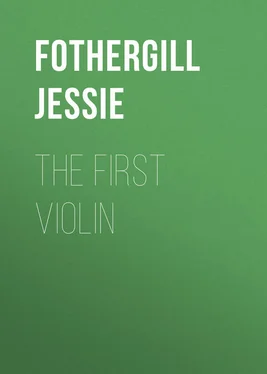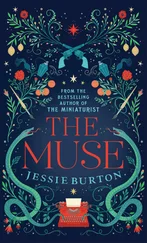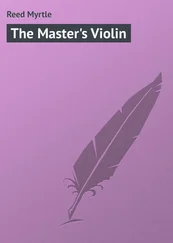Jessie Fothergill - The First Violin
Здесь есть возможность читать онлайн «Jessie Fothergill - The First Violin» — ознакомительный отрывок электронной книги совершенно бесплатно, а после прочтения отрывка купить полную версию. В некоторых случаях можно слушать аудио, скачать через торрент в формате fb2 и присутствует краткое содержание. Жанр: foreign_antique, foreign_prose, foreign_sf, на английском языке. Описание произведения, (предисловие) а так же отзывы посетителей доступны на портале библиотеки ЛибКат.
- Название:The First Violin
- Автор:
- Жанр:
- Год:неизвестен
- ISBN:нет данных
- Рейтинг книги:4 / 5. Голосов: 1
-
Избранное:Добавить в избранное
- Отзывы:
-
Ваша оценка:
- 80
- 1
- 2
- 3
- 4
- 5
The First Violin: краткое содержание, описание и аннотация
Предлагаем к чтению аннотацию, описание, краткое содержание или предисловие (зависит от того, что написал сам автор книги «The First Violin»). Если вы не нашли необходимую информацию о книге — напишите в комментариях, мы постараемся отыскать её.
The First Violin — читать онлайн ознакомительный отрывок
Ниже представлен текст книги, разбитый по страницам. Система сохранения места последней прочитанной страницы, позволяет с удобством читать онлайн бесплатно книгу «The First Violin», без необходимости каждый раз заново искать на чём Вы остановились. Поставьте закладку, и сможете в любой момент перейти на страницу, на которой закончили чтение.
Интервал:
Закладка:
“I don’t know,” I was reluctantly obliged to confess, for I saw that the assembled youths, though not looking at me openly, and apparently entirely engrossed with their dinners, were listening attentively to what passed.
“You don’t know,” repeated Fräulein Sartorius, quickly seeing through my thin assumption of indifference, and proceeding to draw me out as much as possible. I wished Adelaide had been there to beat her from the field. She would have done it better than I could.
“No; because I have never been to any.”
“Haven’t you? How odd! How very odd! Isn’t it strange?” she added, appealing to the boys. “Fräulein has never been to a theater or a concert.”
I disdained to remark that my words were being perverted, but the game instinct rose in me. Raising my voice a little, I remarked:
“It is evident that I have not enjoyed your advantages, but I trust that the gentlemen” (with a bow to the listening boys) “will make allowances for the difference between us.”
The young gentlemen burst into a chorus of delighted giggles, and Anna, shooting a rapid glance at me, made a slight grimace, but looked not at all displeased. I was, though, mightily; but, elate with victory, I turned to my compatriot at the other end of the table, and asked him at what time of the year Elberthal was pleasantest.
“Oh,” said he, “it’s always pleasant to me, but that’s owing to myself. I make it so.”
Just then, several of the other lads rose, pushing their chairs back with a great clatter, bowing to the assembled company, and saying “Gesegnete Mahlzeit!” as they went out.
“Why are they going, and what do they say?” I inquired of Miss Sartorius, who replied, quite amiably:
“They are students at the Realschule. They have to be there at two o’clock, and they say, ‘Blessed be the meal-time,’ as they go out.”
“Do they? How nice!” I could not help saying.
“Would you like to go for a walk this afternoon?” said she.
“Oh, very much!” I had exclaimed, before I remembered that I did not like her, and did not intend to like her. “If Miss Hallam can spare me,” I added.
“Oh, I think she will. I shall be ready at half past two; then we shall return for coffee at four. I will knock at your door at the time.”
On consulting Miss Hallam after dinner, I found she was quite willing for me to go out with Anna, and at the time appointed we set out.
Anna took me a tour round the town, showed me the lions, and gave me topographical details. She showed me the big, plain barrack, and the desert waste of the Exerzierplatz spreading before it. She did her best to entertain me, and I, with a childish prejudice against her abrupt manner, and the free, somewhat challenging look of her black eyes, was reserved, unresponsive, stupid. I took a prejudice against her – I own it – and for that and other sins committed against a woman who would have been my friend if I would have let her, I say humbly, Mea culpa!
“It seems a dull kind of a place,” said I.
“It need not be. You have advantages here which you can’t get everywhere. I have been here several years, and as I have no other home I rather think I shall live here.”
“Oh, indeed.”
“You have a home, I suppose?”
“Of course.”
“Brothers and sisters?”
“Two sisters,” I replied, mightily ruffled by what I chose to consider her curiosity and impertinence; though, when I looked at her, I saw what I could not but confess to be a real, and not unkind, interest in her plain face and big eyes.
“Ah! I have no brothers and sisters. I have only a little house in the country, and as I have always lived in a town, I don’t care for the country. It is so lonely. The people are so stupid too – not always though. You were offended with me at dinner, nicht wahr ?”
“Oh, dear, no!” said I, very awkwardly and very untruly. The truth was, I did not like her, and was too young, too ignorant and gauche to try to smooth over my dislike. I did not know the pain I was giving, and if I had, should perhaps not have behaved differently.
“ Doch! ” she said, smiling. “But I did not know what a child you were, or I should have let you alone.”
More offended than ever, I maintained silence. If I were certainly touchy and ill to please, Fräulein Sartorius, it must be owned, did not know how to apologize gracefully. I have since, with wider knowledge of her country and its men and women, got to see that what made her so inharmonious was, that she had a woman’s form and a man’s disposition and love of freedom. As her countrywomen taken in the gross are the most utterly “in bonds” of any women in Europe, this spoiled her life in a manner which can not be understood here, where women in comparison are free as air, and gave no little of the brusqueness and roughness to her manner. In an enlightened English home she would have been an admirable, firm, clever woman; here she was that most dreadful of all abnormal growths – a woman with a will of her own.
“What do they do here?” I inquired, indifferently.
“Oh, many things. Though it is not a large town there is a School of Art, which brings many painters here. There are a hundred and fifty – besides students.”
“And you are a student?”
“Yes. One must have something to do – some carrière – though my countrywomen say not. I shall go away for a few months soon, but I am waiting for the last great concert. It will be the ‘Paradise Lost’ of Rubenstein.”
“Ah, yes!” said I, politely, but without interest. I had never heard of Rubenstein and the “Verlorenes Paradies.” Before the furor of 1876, how many scores of provincial English had?
“There is very much music here,” she continued. “Are you fond of it?”
“Ye-es. I can’t play much, but I can sing. I have come here partly to take singing lessons.”
“So!”
“Who is the best teacher?” was my next ingenuous question.
She laughed.
“That depends upon what you want to learn. There are so many: violin, Clavier , that is piano, flute, ’cello, everything.”
“Oh!” I replied, and asked no more questions about music; but inquired if it were pleasant at Frau Steinmann’s.
She shrugged her shoulders.
“Is it pleasant anywhere? I don’t find many places pleasant, because I can not be a humbug, so others do not like me. But I believe some people like Elberthal very well. There is the theater – that makes another element. And there are the soldiers and Kaufleute – merchants, I mean, so you see there is variety, though it is a small place.”
“Ah, yes!” said I, looking about me as we passed down a very busy street, and I glanced to right and left with the image of Eugen Courvoisier ever distinctly if unconfessedly present to my mental view. Did he live at Elberthal? and if so, did he belong to any of those various callings? What was he? An artist who painted pictures for his bread? I thought that very probable. There was something free and artist-like in his manner, in his loose waving hair and in his keen susceptibility to beauty. I thought of his emotion at hearing that glorious Bach music. Or was he a musician – what Anna Sartorius called ein Musiker ? But no. My ideas of musicians were somewhat hazy, not to say utterly chaotic; they embraced only two classes: those who performed or gave lessons, and those who composed. I had never formed to myself the faintest idea of a composer, and my experience of teachers and performers was limited to one specimen – Mr. Smythe, of Darton, whose method and performances would, as I have since learned, have made the hair of a musician stand horrent on end. No – I did not think he was a musician. An actor? Perish the thought, was my inevitable mental answer. How should I be able to make any better one? A soldier, then? At that moment we met a mounted captain of Uhlans, harness clanking, accouterments rattling. He was apparently an acquaintance of my companion, for he saluted with a grave politeness which sat well upon him. Decidedly Eugen Courvoisier had the air of a soldier. That accounted for all. No doubt he was a soldier. In my ignorance of the strictness of German military regulations as regards the wearing of uniform, I overlooked the fact that he had been in civilian’s dress, and remained delighted with my new idea; Captain Courvoisier. “What is the German for captain?” I inquired, abruptly.
Читать дальшеИнтервал:
Закладка:
Похожие книги на «The First Violin»
Представляем Вашему вниманию похожие книги на «The First Violin» списком для выбора. Мы отобрали схожую по названию и смыслу литературу в надежде предоставить читателям больше вариантов отыскать новые, интересные, ещё непрочитанные произведения.
Обсуждение, отзывы о книге «The First Violin» и просто собственные мнения читателей. Оставьте ваши комментарии, напишите, что Вы думаете о произведении, его смысле или главных героях. Укажите что конкретно понравилось, а что нет, и почему Вы так считаете.












